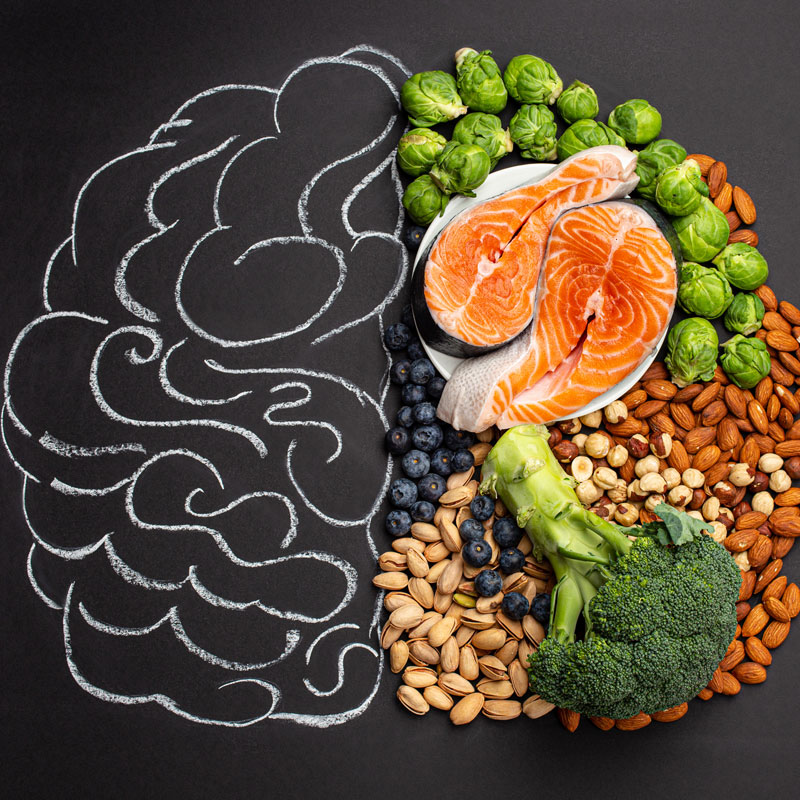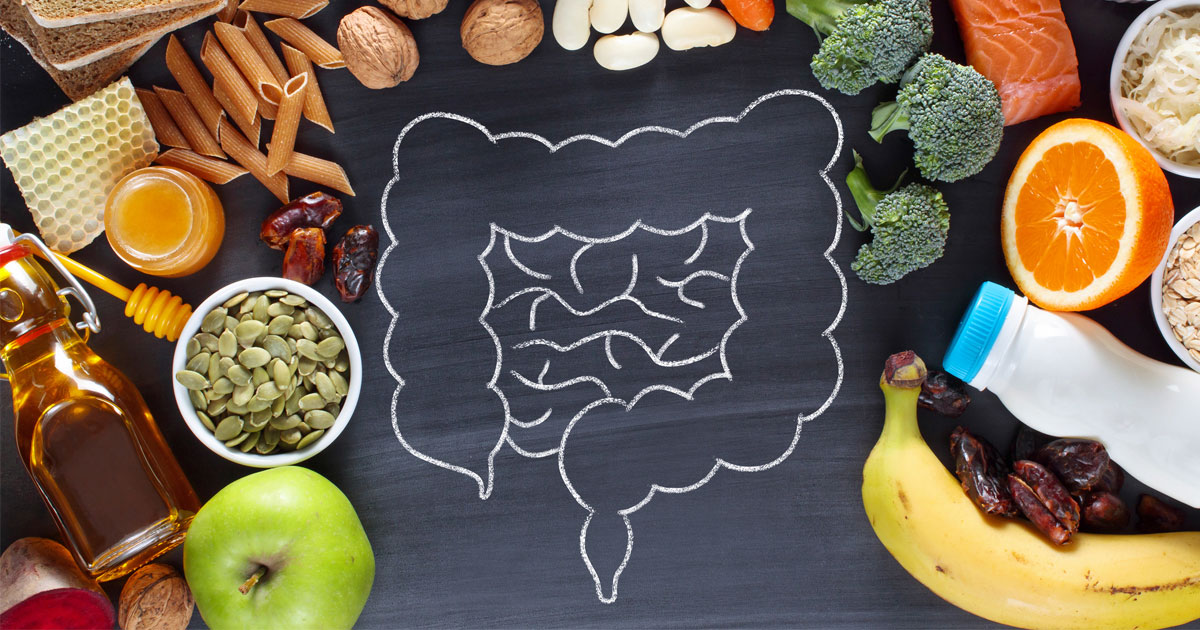Nutrition plays a key role in healing both the body and the brain in recovery. Proper nutrition contributes to the overall well-being of all individuals, a state which is especially important for people in recovery from substance use disorder (SUD). Attention to nutrition during treatment and beyond can significantly decrease the hardships many people face during this time—and for some, the rest of their lives.
Nutrition and Addiction Treatment
Replenishing the vital nutrients and vitamins lost during substance use and detoxification is essential in treating SUD. Restoring physical health with proper nutrition is often one of the primary steps taken during detoxification and SUD treatment. In addition, learning healthy eating habits at the onset of treatment can help establish lifestyle changes that can set you up for success as you move forward.
However, nutrition isn’t just about the body. Using nutrition to treat addiction does not only benefit the body, but it also helps to heal the brain in recovery. It can be a vital component of addressing some of the mental health issues associated with recovery, such as depression and anxiety. In fact, symptoms of these disorders are commonly attributed to malnutrition, a fact that many treatment providers overlook. Overall, when nutrition education is part of treatment and recovery, you have another tool in your arsenal to prevent relapse.
The Link Between Nutrition and Addiction
A 2021 study from Massachusetts General Hospital shows a critical link between vitamin D deficiency and SUD, specifically opioid use disorder (OUD). The research indicates that people who are deficient in vitamin D are more likely to develop substance use disorder (SUD), at least partially because they experience strong cravings that are relieved by opioid drugs. The background of this study is interesting in that it originally sought to link vitamin D deficiency to people who liked to use tanning beds, the sun, and other sources of ultraviolet radiation.
Researchers discovered that UVB ray exposure produced endorphin neurotransmitters in the skin, and endorphins are chemically similar to opioids. The link between UV rays and vitamin D, which humans cannot produce themselves, is that UV radiation is necessary to produce vitamin D. Researchers found that those relentlessly seeking UV exposure were actually vitamin D deficient. Because of this information, researchers have begun exploring vitamin D supplementation as a tool in fighting opioid addiction, both during the prevention and recovery stages.
SUD and Nutrition
People with a substance use disorder often prioritize substance use over everything else in their lives. This includes work, family and friends, maintaining healthy sleeping patterns, exercising, cooking, and eating a proper diet. When multiple systems are not being cared for in this way, the body is especially vulnerable to other negative factors.
The research concludes that SUD can affect nutrition in the following ways:
- Lack of eating. Stimulant substances are appetite suppressants, while substances like alcohol and opioids can cause people to forget to eat altogether. This results in periods of time when the body is without food, increasing the risk of malnutrition.
- Not eating enough healthy foods. Once someone with SUD buys the substance of their use disorder, they may lack the funds or motivation to secure a proper meal. Others choose to eat unhealthy, limited food items easily available to them, which are not enough to maintain proper nutrition.
- Binge eating. Many people who are intoxicated or coming down from a high may suddenly get their appetite back or become extremely hungry. They may eat until they are uncomfortable, which limits the body’s ability to utilize the nutrients and burn off the fats.
When an individual seeks SUD recovery, a proper diet and balanced nutrition can help the body heal at its optimal level. Otherwise, the negative effects of a poor diet, such as depression, decreased immune response, muscle weakness, and other effects, will make recovery much more difficult and prolong the healing process.
Nutrition Prepares You for Addiction Recovery
Treatment for SUD should be a unique process for each person. Many programs incorporate multiple treatment approaches to healing the mind and body together. Nutritional counseling and diet journaling is one way to retrain good eating habits. Staying hydrated is also essential to body and brain function. It is especially important to maintain proper nutrition to treat addiction and throughout recovery. The brain reacts directly to the food the body receives, and all systems work together so that they all operate at peak function.
One study shows a link between dietary habits and symptoms of depression. In fact, the risk of depression is up to 35% lower in individuals who eat diets that do not include any processed foods or refined sugars. Your chances of avoiding depression or other mental health issues can be further reduced if you consume only moderate amounts of dairy and lean meats.
Choose the Right Foods for Your Brain
The typical American diet is not conducive to brain healing during SUD treatment. As mentioned, foods that are processed, high in sugar, low in fiber, and full of unhealthy fats like omega 6 fats (e.g., vegetable oils) can cause inflammation in the body and contribute to mental illness and an overall unhealthful feeling. This can be detrimental to people in recovery.
Furthermore, bad eating habits that were adopted in SUD are hard to break. For these reasons, it is important to make a conscious effort to select good foods during treatment and throughout recovery. A healthy diet that promotes recovery of all the body’s systems includes a balance of grains, carbohydrates, proteins, dairy, and fruits and vegetables.

How to Eat for Recovery
No matter the substance you’ve struggled with, look for these vitamins and minerals to help the body return to homeostasis during recovery:
- Vitamin C and zinc promote healing in the body.
- Vitamin D and calcium contribute to healthy bones.
- B vitamins boost energy, repair tissues, and build muscle.
- Potassium regulates nerve functions and maintains fluid levels.
- Magnesium helps stabilize hormones and immunity and aids in the proper function of the neuromuscular and cardiovascular systems.
For example, leafy green vegetables like kale, spinach, arugula, broccoli, and cabbage provide nutrients that decrease inflammation, boost the immune system, and heal wounds. Berries provide a wealth of antioxidants that support the natural recovery process of the body. Nuts and seeds are great at fighting disease and infection. Poor choices and bad eating habits will only make the process more difficult and take longer.
Nutrients Important for Recovery
Amino acids are essential for helping the brain balance dopamine levels during recovery. This helps create an environment in which the brain can change, heal, and learn to repeat healthier habits. These include red meat, fish, chicken, seafood, and dairy products like milk, cheese, yogurt, and eggs.
A moderate amount of complex carbohydrates helps stabilize mood and contributes to better sleep. Carbohydrates assist the brain in producing serotonin, which lessens cravings for substance use. As cravings lessen, the brain in recovery can spend more energy on creating new and healthy neural connections. Try unprocessed or whole grains, fruits, vegetables, and beans.
Foods that have healthy fats like omega-3 fatty acids reduce inflammation of the cells and protect cell membranes, which can promote brain healing. Foods like olive oil, sunflower seeds, peanut butter, soy milk, walnuts, almonds, pecans, salmon, tuna, and avocados all contain healthy fats that can reduce the time the brain needs to adopt healthier, new habits. Try cooking with healthy oils, swapping out croutons for nuts or seeds, and switching from butter and mayonnaise to avocado on your next sandwich.
During SUD treatment, digestive health should not be overlooked. Substance use takes its toll on the digestive tract, just as it does other bodily systems. In recovery, it’s important to take care to reestablish the delicate balance of the gut. A healthy microbiome is best established by eating a variety of fruits, vegetables, and legumes because they are high in fiber. In turn, fiber can help you establish regularity and process sugars.
High-fiber foods that can boost intestinal health during recovery include the following:
- Artichokes
- Broccoli
- Green peas
- Lentils
- Beans
- Chickpeas
- Whole grains
- Raspberries
- Bananas
- Apples
The body does not effectively digest fiber on its own, but certain bacteria in the gut can assist. For proper fiber digestion, cultivate the growth of healthy bacteria in the gut. To supplement positive bacteria in the gut, add blueberries, almonds, and pistachios, which are known to increase beneficial Bifidobacterium. These bacteria can prevent inflammation in the intestines and improve overall gut health.

Another way to enhance gut health is to consume fermented foods like kimchi, kefir, tempeh, kombucha, and sauerkraut. These foods have lactobacilli, also beneficial bacteria. Yogurt is one of the best foods for probiotics if it's made with starter cultures, doesn't have a lot of sugar, and contains live, active cultures.
Nutrients that Boost Focus and Memory
In addition to a generally healthy diet, it is crucial to provide the brain with the nutrients it needs to reverse the cognitive losses you may have experienced during active SUD. Fortunately, there are specific foods that provide extra brain power to individuals in recovery from SUD. Vitamins C, D, and E, omega-3 fatty acids, flavonoids, and polyphenols are all believed to reverse cognitive decline.
Brain-boosting foods include the following:
- Leafy greens – Leafy greens are rich in vitamin K, lutein, folate, and beta-carotene, which are believed to slow cognitive decline.
- Berries – Berries include flavonoids and antioxidants, compounds that give them their bold colors and protect against cell damage and death. These nutrients also improve memory.
- Caffeine – Coffee and tea not only help short-term concentration but are also useful for long-term mental function.
- Walnuts – Walnuts are believed to improve memory.
Nutrition for Addiction Recovery

Nutrition-conscious treatment programs can help you improve your health, make other therapies more beneficial, and reduce the chance of relapse. Learn more about SUD treatment and healthy recovery via our newsletter.
Sources:
- https://www.science.org/doi/10.1126/sciadv.abe4577
- https://www.ncbi.nlm.nih.gov/pmc/articles/PMC8114851/
- https://www.health.harvard.edu/blog/nutritional-psychiatry-your-brain-on-food-201511168626

Clinical Director
Christine Todd is a Licensed Professional Counselor and an Advanced Certified Drug and Alcohol Counselor who enjoys working directly with a population that struggles with addiction and mental health disorders. Christine brings many years of clinical experience to the team at Recovery Cove, where she is currently the Clinical Director. In her role, she oversees the clinical department as a leader, educator and mentor, designing programming and protocols for a diverse client population.




